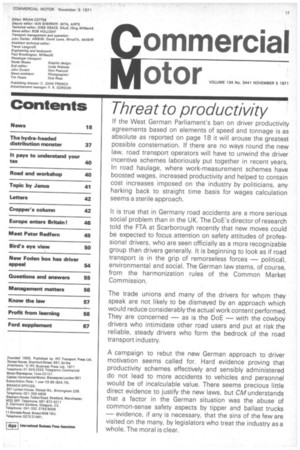ommercial otor
Page 19

If you've noticed an error in this article please click here to report it so we can fix it.
Threat to productivity
If the West German Parliament's ban on driver productivity agreements based on elements of speed and tonnage is as absolute as reported on page 18 it will arouse the greatest possible consternation. If there are no ways round the new law, road transport operators will have to unwind the driver incentive schemes laboriously put together in recent years. In road haulage, where work-measurement schemes have boosted wages, increased productivity and helped to contain cost increases imposed on the industry by politicians, any harking back to straight time basis for wages calculation seems a sterile approach.
It is true that in Germany road accidents are a more serious social problem than in the UK. The DoE's director of research told the FTA at Scarborough recently that new moves could be expected to focus attention on safety attitudes of professional drivers, who are seen officially as a more recognizable group than drivers generally. It is beginning to look as if road transport is in the grip of remorseless forces — political, environmental and social. The German law stems, of course, from the harmonization rules of the Common Market Commission.
The trade unions and many of the drivers for whom they speak are not likely to be dismayed by an approach which would reduce considerably the actual work content performed. They are concerned — as is the DoE — with the cowboy drivers who intimidate other road users and put at risk the reliable, steady drivers who form the bedrock of the road transport industry.
A campaign to rebut the new German approach to driver motivation seems called for. Hard evidence proving that productivity schemes effectively and sensibly administered do not lead to more accidents to vehicles and personnel would be of incalculable value. There seems precious little direct evidence to justify the new laws, but CM understands that a factor in the German situation was the abuse of common-sense safety aspects by tipper and ballast trucks — evidence, if any is necessary, that the sins of the few are visited on the many, by legislators who treat the industry as a whole. The moral is clear.




































































































































































